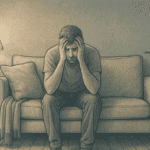What Is a Mental Breakdown? Symptoms, Causes, and How to Recover

The term “mental breakdown” sounds quite serious. And that’s because it usually is. For many of us, life can become overwhelming, as personal issues, family problems, and work pressures can all seem to pile on at once.
Many people will have felt overwhelmed at some point in their lives. However, a mental breakdown happens when these pressures become too much for someone to handle, and they lose their sense of control.
A mental breakdown interferes with daily life in a way that affects normal functioning. Those affected can withdraw socially and become depressed, affecting their relationships, career, and more.
The good news is that support is available, and Mission Connection is here to help. Let this article serve as a guide as it takes you through:
- What a nervous breakdown is
- The difference between anxiety and breakdown
- Nervous breakdown vs burnout
- What causes nervous breakdowns or mental collapse
- The signs and symptoms of a mental breakdown
- Signs you’re mentally overloaded
- How long a nervous breakdown lasts
- How to treat a nervous breakdown
- Recovering from a mental breakdown
- Mental health support after a breakdown

What Is a Nervous Breakdown?
A nervous breakdown can also be known as a “mental breakdown” or “emotional collapse.” Each of these terms refers to a period of time when someone’s mental health is struggling to the extent that their ability to function normally is disrupted. This is evidenced through how many people going through a nervous breakdown often say that they feel like they’re “falling apart.”
During a nervous or mental breakdown, day-to-day tasks can feel almost impossible. Getting out of bed in the morning, doing a full shift at work, preparing a meal, or looking after your family. Any and all of this can feel like too much. Further, not doing these essential tasks can make things feel worse as the “to-do” lists pile up.
From the outside, a breakdown can look like becoming very tearful and emotional, or conversely, numb and detached from the reality of life. However, symptoms can vary, and regardless of how they show, they should be thought of as a signal that the mind and body are overwhelmed – and need rest and care.1
A nervous or mental breakdown is not a clinical diagnosis, but associated factors, like depression, can be. Therefore, it’s important to consult a mental health professional if you’re concerned that you’re experiencing the signs of mental collapse.
Difference Between Anxiety and Breakdown
In some instances, a breakdown can be confused with anxiety, as many of their emotional and physical symptoms overlap. But there is a clear difference between anxiety and breakdown.
Let’s first define what anxiety is. Anxiety is the experience of ongoing worry or fear – often without a clear trigger or reason. However, many people, with the right support and management strategies, can learn to cope and live with anxiety. It doesn’t always need to be an obstacle in the way of a normal, functioning life.
A mental breakdown, on the other hand, is the result of long-term anxiety or stress. It’s not a case of regularly “feeling nervous,” as can be typical of mild general anxiety. It’s the point at which someone becomes too overloaded to cope. So, while severe anxiety can impact daily functioning, a breakdown can feel like life has come to a halt entirely.
This point leads into another key difference between anxiety and breakdown. While anxiety can sometimes build gradually, a breakdown can feel sudden and impactful. Some describe it as “hitting a brick wall” or “snapping.”
Of course, anxiety, if left untreated, can contribute to a breakdown. For this reason, a mental breakdown can come with panic attacks, uncontrollable emotions, or sometimes physical symptoms like chest pain and dizziness.2
Nervous Breakdown vs Burnout
The term “burnout” has become increasingly recognized, especially due to how modern-day work pressure and mental overload can affect mental well-being. Burnout describes a feeling of mental and physical exhaustion, particularly after demanding periods at work.
Maybe you’re a nurse who’s worked three night shifts in a row and then has to look after two young kids who are off school for the summer. Or, perhaps you’re looking after a sick family member while holding down a full-time job. Each of these scenarios and more can lead to exhaustion, detachment, demotivation – and burnout.
Based on the signs of burnout, it’s easy to see why burnout might get confused with a breakdown. So let’s highlight the key differences.
Burnout tends to be gradual and is usually marked by emotional exhaustion. While it can make someone overly emotional or demotivated, it often doesn’t interfere with daily life to the extent of a breakdown.
A breakdown can have similar symptoms to burnout, but in a more intense and “all-consuming” way. For instance, a breakdown can involve uncontrollable emotions, struggles completing simple tasks, and feelings of hopelessness. Therefore, if you or a loved one displays these sorts of behaviours, then these experiences may go beyond burnout.3
Additionally, research has also shown an important distinction between nervous breakdowns vs burnout. Burnout responds well to rest and a reduction in workload, but breakdowns often need professional mental health intervention, such as therapy and medication.4
What Causes a Nervous Breakdown or Mental Collapse?
There’s no one single cause of a mental breakdown. It’s usually a mix of different contributing factors, including work, family, relationships, and so on. Each of these factors can “snowball” or build up over time to lead to a breakdown if not well managed.
The following is a list of some of the most common causes of breakdowns:
- Conflict within families or relationships
- Traumatic experiences such as a loss or accident
- Long-term struggles with mental health conditions, such as depression or anxiety
- Sleep deprivation
- Living with chronic illness or pain
- Ongoing career work stress
- Financial pressures
It’s important to note that breakdowns can also come after a significant life change, like moving, starting a new job, or becoming a parent.
Additionally, some people are prone to “bottling things up.” For these people, a breakdown can arise with no definable cause. Instead, it’s the result of a mix of life’s pressures that haven’t been dealt with over a long time, even years.
Research has shown that without the proper support or rest, stressors can lead to breakdowns.5 Thankfully, with increasing mental health awareness, support, and strategies for preventing suppression of emotions, it’s possible to both prevent and treat breakdowns. We will go into this more later.
What Are the Signs and Symptoms of a Mental Breakdown?
Sometimes it’s not so easy to know exactly when someone is having a breakdown. In fact, a commonly asked question is “How do I know if I’m having a breakdown?”
Trying to figure out whether you’re experiencing mental collapse can be stressful to navigate – and the signs and symptoms of a mental breakdown can vary from person to person. However, there are some common signs to watch out for, including the following.
Symptoms of a Mental Breakdown:6
- Mental health crisis symptoms: Including racing thoughts, difficulty focusing, and panic attacks
- Behavioural changes: Including withdrawing from people, not prioritising personal hygiene, and avoiding responsibilities
- Emotional signs: Including extreme sadness, irritability, tearfulness without a clear reason, and feeling “numb”
- Physical symptoms of a nervous breakdown: Including fatigue, insomnia, headaches, upset stomach, and chest tightness
What Are the Signs You’re Mentally Overloaded?
It’s important to highlight the signs of mental overload as these can serve as useful red flags to signal a potential breakdown. Likewise, it’s good to be aware of these emotional collapse signs ahead of time so that support and prevention strategies can be implemented to avoid a point of crisis.
Common signs of mental overload include:
- Emotionally overreacting to relatively small issues
- Finding it difficult to make simple choices
- Withdrawing from people or responsibilities
- Feeling exhausted or like you’re “running on empty”
- Falling into unhealthy habits like comfort eating, risky behaviors, or “doom-scrolling” on your phone 7
- Difficulty concentrating
- Persistent worry
- Poor sleep
If these symptoms sound familiar to you or you see them in a loved one, then it may be time to consider slowing down and reassessing. Mission Connection is here to put your mental health first.
How Long Does a Nervous Breakdown Last?: Factors That Affect Recovery Time
Nervous breakdown recovery time varies from person to person. Some may start to feel better in a few weeks, while others may need months to fully recover.
The speed of recovery is also influenced by a number of factors:8
- The severity of the mental breakdown
- Any pre-existing support systems available, and how strong these support networks are
- Whether there are underlying health conditions, and if there’s a history of struggles with mental health
- How quickly support or treatment is received. Research has shown that those who get help early and willingly engage in therapy have better outcomes.
It’s worth noting that some people may relapse if they return too quickly to high-stress environments or stop therapy too early. Recovery that is enduring and lasting usually involves making long-term sustainable changes to manage well-being.
How to Treat a Nervous Breakdown: Nervous Breakdown Treatment Options
If you, or someone you love, is going through a nervous breakdown, what can you do?
Fortunately, there are several treatment options available to help someone feel like themselves again. These include:
Talking therapy
Speaking with a therapist allows for a safe, confidential space to vent, process emotions, and learn about coping strategies. Options such as cognitive behavioral therapy (CBT), dialectical behavior therapy (DBT), and mindfulness therapy are all viable options.9
Medication
If mental health symptoms are severe or ongoing, it’s a good idea to speak to your healthcare provider about prescription medications. Usually, these come in the form of antidepressants or anti-anxiety medications.
Stress management techniques
Breathing exercises (controlled, slow deep breaths), journaling, and guided meditation are just a few techniques that can help lower stress levels. Moreover, these strategies can be used anywhere at any time, even at work.
Self-care
Prioritising your wellbeing by making lifestyle changes, such as taking time off work, going to bed earlier to improve sleep, exercising regularly, and so on can make meaningful, sustainable improvements.
Social support
Talking to friends and family can be enough for some. However, joining a support group can make all the difference and serve as a valuable reminder that you are not alone.
Psychoeducation
Gaining an understanding of what’s happening to you and why can help you learn how to feel more in control. Studies have shown that taking a deeper interest in the factors behind well-being improves outcomes in the long term.10
Mental Health Support After Breakdown
After a breakdown, it’s important to have the right support on hand to prevent yourself or someone you love from sinking back into poor mental health. Ongoing support may involve regular therapy sessions, medical follow-ups (if on medication), following a wellness plan with daily goals, or engaging with support groups and online communities.
Importantly, whatever happens, the return to “normal life” after a breakdown should be gradual. Take baby steps, as careful consideration should be given to previous lifestyle factors to avoid further mental overload. For instance, you could try a phased return to work or education, or start with low-stress tasks.
The good news is that Mission Connection is at hand to help you, or someone you care about, navigate a mental breakdown. From prevention to treatment and aftercare, our dedicated team can ensure the transition to recovery is as smooth as possible.
If these symptoms sound familiar to you or you see them in a loved one, then it may be time to consider slowing down and reassessing. Mission Connection is here to put your mental health first.
Mission Connection: Helping You Understand When to Seek Help for a Breakdown
Managing everything that comes with a mental breakdown can be very challenging. Mission Connection is dedicated to ensuring that the process of navigating a breakdown is as smooth as possible. Our team offers comprehensive medication monitoring alongside various treatments and therapies, enhancing your chances for successful and sustained recovery.
Medication alone may not address the root causes of mental health issues – but alternatives are available. Combining medication with therapy options, holistic approaches, and lifestyle changes can increase its benefits and improve your outcomes.
Recognizing that life doesn’t pause while you’re focusing on your mental health, our team also provides online telehealth services to accommodate your schedule. This flexibility allows you to receive care that fits seamlessly into your daily routine.
If you’re ready to explore our treatment options or have questions about medication, contact us today or complete our confidential contact form for more information.

References
- Mental Health Foundation. (2023). Understanding mental health problems. https://www.mentalhealth.org.uk/explore-mental-health/a-z-topics/mental-health-problems
- American Psychological Association. (2022). Anxiety. https://www.apa.org/topics/anxiety
- World Health Organization. (2019). Burn-out an “occupational phenomenon”: International Classification of Diseases. https://www.who.int/news/item/28-05-2019-burn-out-an-occupational-phenomenon-international-classification-of-diseases
- Salvagioni, D. A. J., et al. (2017). Physical, psychological and occupational consequences of job burnout: A systematic review of prospective studies. PLoS One, 12(10), e0185781. https://doi.org/10.1371/journal.pone.0185781
- Cocker, F., & Joss, N. (2016). Compassion fatigue among healthcare, emergency and community service workers: A systematic review. International Journal of Environmental Research and Public Health, 13(6), 618. https://doi.org/10.3390/ijerph13060618
- Harvard Health Publishing. (2021). What happens during a nervous breakdown?https://www.health.harvard.edu/mind-and-mood/what-happens-during-a-nervous-breakdown
- American Institute of Stress. (2023). Stress effects. https://www.stress.org/stress-effects
- Harvey, S. B., et al. (2011). Depression and work performance: An ecological study using web-based screening. Occupational Medicine, 61(3), 209–211. https://doi.org/10.1093/occmed/kqr020
- Hofmann, S. G., et al. (2012). The efficacy of cognitive behavioral therapy: A review of meta-analyses. Cognitive Therapy and Research, 36(5), 427–440. https://doi.org/10.1007/s10608-012-9476-1
- Donker, T., et al. (2009). Psychoeducation for depression, anxiety and psychological distress: A meta-analysis. BMC Medicine, 7, 79. https://doi.org/10.1186/1741-7015-7-79






